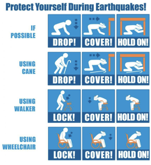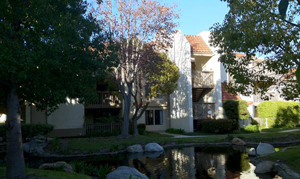
FIRE SAFETY
What to do when an emergency strikes and you discover a fire:
- Make sure your smoke detectors are in working order
- If you discover a fire, leave the fire area
- Close all doors behind you
- Activate the fire alarm
- Use exit stairwells and leave the building immediately. DO NOT USE THE ELEVATOR
- Call 9-1-1 and ask to be transferred to the fire department. Give the dispatcher the address and location of the building
- Do NOT Return to your unit until the fire department has instructed you to do so
If you hear the evacuation fire alarm
- Before you open the door, feel the knob for heat. If the knob is not hot, braced yourself against the door and slightly open it.
- If you feel pressure or a hot draft, close the door quickly.
- If you find no fire or smoke in the corridor, close the door quickly behind you, grab your house key and leave using the stairwell.
- If you encounter smoke in the corridor or stairwell, take an alternative exit where it may be clear, or return to your unit.
- Listen for instructions or information which may be given by authorized personnel.
- If an evacuation is necessary, then take your house key, close the door behind you, and leave by the nearest stairwell. Report to your building’s evacuation area
- See Evacuation Maps
What if you cannot leave your unit
- Close the door and leave it unlocked for possible entry by the fire dept.
- Dial 9-1-1 and give the dispatcher your addresses.
- Use wet towels, sheets or masking tape to seal all cracks where smoke might get in
- Crouch low to the floor if smoke enters the room
- If your condo fills with smoke, move to your patio and close the door behind you. Bring a phone if possible
- If you can’t get to your patio, move to the most protected room and crack open a window for air. (close window if smoke comes in)
- Wait to be rescued. Remain calm. Don’t jump
- Listen for instructions by the fire department
When Should I Go?
As soon as possible when you hear the fire alarm or discover a fire; when the fire is in your unit, or when the fire is on your floor or the floor below you. From there, you will report to your building’s evacuation location.
When Should I Stay?
If you encounter smoke in the corridor on your floor; if there’s smoke in the stairwell; if instructed by the fire dept., and if you are physically unable to use the stairs. ■ |
|
EARTHQUAKE SAFETY
Earthquakes can happen without warning. Being prepared and knowing what to do is the first step. Developing an out-of-state contact is a wise choice. In addition, you may wish to secure items such as bookcases, refrigerators, televisions, and objects that hang on walls. Store heavy and breakable objects on low shelves
At Home
Drop and cover under a sturdy piece of furniture and hold on with one hand and be ready to move with the table or desk when it moves.
If you can’t find anything to cover under, hold on to your head and neck with both arms and hands and crawl next to an interior wall (away from windows). DO NOT STAND IN A DOORWAY
If in bed, turn face down and cover your head and neck with a pillow, or lay on the floor beside your bed.
If you are outdoors, stay outdoors away from buildings, electrical poles, trees, etc.
Outdoors & Driving
Stay there. Move away from all trees, buildings, streetlights and power lines
Stay seated in an open area where nothing can fall on you.
If Your Building is Damaged
If you are in a damaged building, go outside and quickly move away from the building and report to your building’s evacuation location (see attached map).
If you are trapped, protect your mouth, nose and eyes from dust. Send a text, or bang on a pipe or wall, or use a whistle instead of shouting so that rescuers can locate you.
BEING PREPARED
Here’s how to prepare an evacuation “go bag” that you can quickly grab in case you ever need to evacuate. Place in an easily accessible area near an exit, along with a pair of shoes.
Choose a bag. Each member of the family should have his or her own. Start with a backpack or a nylon camper’s laundry bag with a drawstring.
Take photos of all the rooms in your unit, along with all your valuables.
 Gather all your important documents and have them easily accessible by either putting them in your “go to bag”, or you can place the documents all together in a bin, a box or a folder. Important items include: Gather all your important documents and have them easily accessible by either putting them in your “go to bag”, or you can place the documents all together in a bin, a box or a folder. Important items include:
- Driver’s license
- The deed to your house or equivalent proof such as a tax bill
- Your will and/or trust
- Proof on insurance – house, car and health
- Medical records or web accessible medical records
- Passports
- Social Security Cards
- Birth Certificates
- A list of personal contacts with their addresses and phone numbers
- Your kids’ immunization records
- Your pet’s paperwork for vaccinations and medical history, and make sure your pets are microchipped
Add essential supplies to help you get by for a few days. This includes water (one gallon per person per day), non-perishable food, your medication, a first-aid kit, a flashlight, batteries,  charging devices for phones, clothes, a spare pair of shoes, diapers, and pet supplies. Keep a pair of tennis shoes underneath your bed and another pair in your car. You may also wish to keep a flashlight next to your bed and have another one in your car. In addition, a battery-operated radio is a good suggestion so you can listen for local news reports, or you can turn on your car to listen to the radio. Ready.Gov has a full emergency kit checklist that you can download. charging devices for phones, clothes, a spare pair of shoes, diapers, and pet supplies. Keep a pair of tennis shoes underneath your bed and another pair in your car. You may also wish to keep a flashlight next to your bed and have another one in your car. In addition, a battery-operated radio is a good suggestion so you can listen for local news reports, or you can turn on your car to listen to the radio. Ready.Gov has a full emergency kit checklist that you can download.
Important, please ensure you have a manual garage door key handy in-case the electricity is down. ■ |
|
IMPORTANCE OF HOMEOWNER’S AND RENTER’S INSURANCE
Although the Harbour Vista HOA does carry a master policy that is paid for by your association dues, this includes the “common area” such as the structure of the building, the inside of a wall, such as the pipes and the drywall itself. It is vital for each homeowner and renter to have homeowner’s and/or renter’s insurance. The HOA master policy does not cover individual units and it’s the homeowner’s responsibility to have their separate homeowner’s insurance. Renters should also carry renter’s insurance to cover their possessions and emergency housing.
Not Responsible
In the event of a fire, pipe leak, flood, or other emergency, the HOA is only responsible for repairing “the common” area.If a pipe bursts inside your unit and then floods your neighbors below, you will be responsible for the repair, which is why homeowner’s insurance is so important.
Carpet/flooring/ cabinetry, countertops, walls, paint, and valuables inside your unit will be covered by individual homeowner’s insurance. If you choose to have earthquake insurance on your unit, normally that is an additional cost that would cover your emergency housing and the repair of 80-90% of the interior of your unit.
No one can predict when an emergency is going to take place, but knowing that your condo is “insured” will give you peace of mind.
THE HOA DOES NOT HAVE EARTHQUAKE COVERAGE ■
|
EMERGENCY Numbers:
Emergency Number is alway 911
This number is for life threatening emergencies
Police Emergency Number is 714-960-8843 (24 hours)
Police Main Desk non emergency is 714-960-8843
For Gas and Water Emergencies, use 911.
Gas Emergency (SoCal Gas Company): 1-800-427-2200
Fire Department Use 911. Use 714-536-5411 for non emergency.
Progressive Associative Management (24 hours) is (800) 665-2149. Emergency Number: (714) 394-3335 (after hours) |
|



